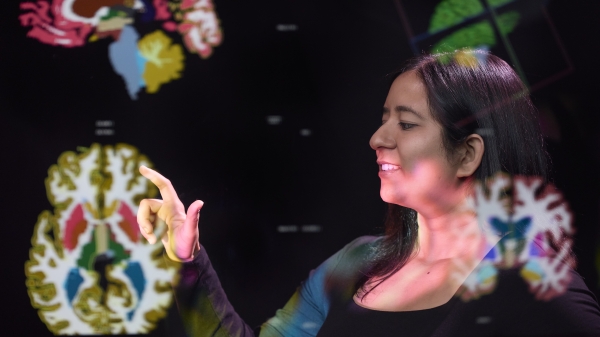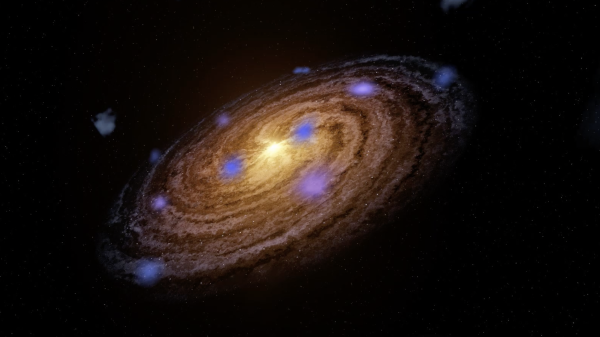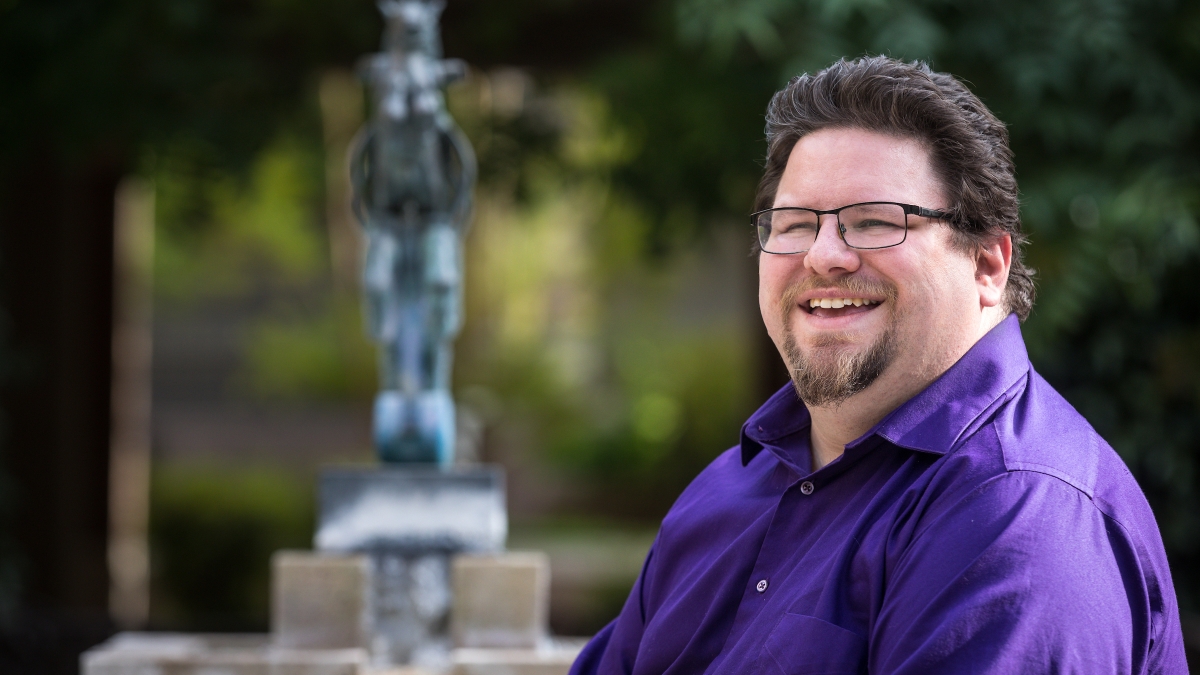Editor’s note: This is part of a series of profiles for spring 2017 commencement. See more graduates here.
A few years ago, John Hart found himself at a crossroads. For a long time, he’d been bouncing from one dead-end job to another, thinking that would be his life forever.
“I had this narrative in my head that I would never be able to afford school, and that I would never be able to manage going to school and work,” Hart said.
That was until he came across a mentor at work who he said pushed him to realize what he was capable of and helped him to change that narrative. He enrolled in community college classes and was off.
This May, he’s graduating from the New College of Interdisciplinary Arts and Sciences at ASU's West campus with a bachelor’s in psychology and has already been accepted to return in the fall of 2017 for the master’s program.
The Barrett Honors student is living proof that all you need is a goal and a will to achieve great things.
During his undergraduate years at ASU, he conducted research on human cognition using West campus’ 3-D motion-capture lab. Hart and his team studied people’s body movements as they performed problem-solving tasks to try to identify a measurable change in movement as they approached the moment of insight.
“If it is possible to be able to detect this underlying, unconscious process that leads up to insight, it’s possible that that can be implemented into educational software, for example, to prompt people who are stuck on a math problem to recognize whether they are close to insight or completely stuck, and change how it prompts them,” Hart explained. “That’s still kind of a far-off possibility though.”
Before he continues his research into human cognition this fall, ASU Now sat down with him to reflect on his progress so far.
Question: What was your “aha” moment, when you realized you wanted to study the field you majored in?
Answer: I had just started taking classes here and there at community college, and before that I had taught myself computer programming and web development, and I thought maybe that was what I wanted to go into but I wasn’t sure. Two of the earliest classes I took at community college were a computer programming course and a psychology course. I was just taking the psychology course to fulfill the social sciences requirement of the degree. Both courses were very remedial, covering stuff I already knew from my own reading and teaching myself. The computer programming course was stuff I already knew and it just felt very irritating to do it over again. The psychology stuff was also mostly stuff I already knew, but I had so much fun in the class engaging in conversations. That was the moment I realized, OK, this is a huge sign. This is what I actually want to do.
Q: What’s something you learned while at ASU — in the classroom or otherwise — that surprised you, that changed your perspective?
A: I would have difficulty pinning it down to just one thing. I think what changed my perspective more than anything was a few key professors who have shown they truly care about the students. They truly care about me. And I’ve found that just that, just knowing that there are these advocates, these professors who truly care and have my back and really want me to succeed and will engage with me outside of class in deep, interesting conversations, has really helped me open up and feel like I actually fit in and helped me actually make progress.
Q: Why did you choose ASU?
A: Partly because they were recruiting at GCC. I actually did look into quite a few colleges. I’m a working adult, I’m an older adult who came back to college, working to support my family. So I felt like I was limited to colleges here in Phoenix. I actually did look at UofA and I almost decided on UofA. I looked at Grand Canyon University, I even looked at University of Phoenix and some of the for-profits.
And along with looking at what they offered and the prices, I really looked at what was the value of the degree? And when I looked into that at all of the for-profit colleges, they just completely fell short for me. I thought it’s not worth it for me to put in this effort and this money for something that I’m not sure is going to be good for me at all.
I’m very glad I went with ASU instead. I’m getting a better education and I’m getting research experience, which I just don’t think would have been possible at those other colleges. And it also has a better reputation.
Q: Why decide on ASU West?
A: Originally, I decided on ASU West because of the location. And also because I got my associate’s degree at Glendale Community College and the recruiters from ASU West were really good about coming to GCC. When I was at GCC, I was a member of Psi Beta, which is the honors society for psychology students in community colleges. The Barrett Honors College and the ASU recruiters came to our meetings and talked about the benefits of ASU West and how nice it was, and they did a really good job of selling it. This campus feels like a small, private college. It’s a really nice atmosphere.
Q: What’s the best piece of advice you’d give to those still in school?
A: I would definitely say — especially for younger students — stick with it. No matter how much it may be frustrating, stick with it and graduate because it is much harder to come back in your 30s and try to do it while you’re working a full-time job. I would also say — and this is for everyone — actually get to know your professors and go to their office hours and see them outside of class. There’s so much benefit in that interaction that you just can’t get in the classroom.
Q: What was your favorite spot on campus, whether for studying, meeting friends or just thinking about life?
A: The Barrett Suite on West campus. It’s on the second floor of UCB. There’s a room in there with beanbags; it’s a really good spot to rest. And there’s an area with chairs and a table, and an open space where I’ve had some amazing conversations.
Q: What are your plans after graduation?
A: This summer is going to be my first break from classes for many years. In the fall, I’m beginning the master’s of science program at ASU West. I’m going to keep working on the research that I’ve been doing as an undergrad. And after I finish my master’s, I want to go into a PhD program.
It is definitely my goal to get into academia, to become a tenure-track professor. I’m also realistic and I know that that field, that whole path in life, is extremely competitive, and there’s also an element of luck. So my fallback plan is data science. Data science is a pretty broad field, but everything that’s being done in businesses and nonprofit organizations, where we take all of this data that we now have about people’s behavior, everything that’s collected from online activity, from our mobile devices, these huge data sets, is being used to figure out how we can get insight out of it.
Traditionally data science has been dominated by people with applied math degrees or computer science degrees. But more and more, businesses are looking for people with psychology and philosophy degrees because they want people who can really think about complex issues, who can think about how to design research. Psychology research actually has a lot of emphasis on using statistics, which is very important in data science. So I feel like with my mathematics background, my job experience as a data analyst at Cox Communications and my psychology education, I’ll be pretty well-prepared to [go into data science] as well if I have to. But I really want to go into academia, do research and teach.
Q: If someone gave you $40 million to solve one problem on our planet, what would you tackle?
A: Something I think is too big of a problem to solve but I think is something that would be good to start trying to solve is inequality in education. We know that there are really great schools out there, and the reason they’re really great schools is because of these small classrooms with really great teachers. And it’d be great if we could just have that everywhere.
That’s something that’s an immense, intractable problem, but I do think that we could start to tackle it. We could maybe find ways to use the research that’s done in cognitive science, in how children learn and develop, to build better schools, to find better ways of finding and training and incentivizing good teachers.
I know it’s a type of problem that a lot of people have tried to tackle and we’ve seen that some of the attempts to fix it have had unintended consequences, like the problem we now have with standardized testing. I think what I would do with that money would be to start a nonprofit foundation that would focus on educational research to try to find ways to make education better.
Top photo by Charlie Leight/ASU Now
More Science and technology

Podcast explores the future in a rapidly evolving world
What will it mean to be human in the future? Who owns data and who owns us? Can machines think?These are some of the questions pondered on a newly launched podcast titled “Modem Futura.” Co-…

New NIH-funded program will train ASU students for the future of AI-powered medicine
The medical sector is increasingly exploring the use of artificial intelligence, or AI, to make health care more affordable and to improve patient outcomes, but new programs are needed to train…

Cosmic clues: Metal-poor regions unveil potential method for galaxy growth
For decades, astronomers have analyzed data from space and ground telescopes to learn more about galaxies in the universe. Understanding how galaxies behave in metal-poor regions could play a crucial…
